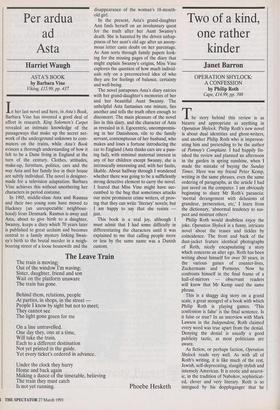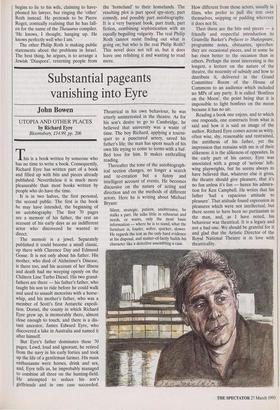Two of a kind, one rather kinder
Janet Barron
OPERATION SHYLOCK: A CONFESSION by Philip Roth Cape, £14.99, pp. 398 The story behind this review is as bizarre and appropriate as anything in Operation Shylock. Philip Roth's new novel is about dual identities and ghost-writers, and another Philip Roth who is imperson- ating him and pretending to be the author of Portnoy's Complaint. I had happily fin- ished the review and planned an afternoon in the garden in spring sunshine, when I made the mistake of buying the Sunday Times. Here was my friend Peter Kemp, writing in the same phrases, even the same ordering of paragraphs, as the article I had just saved on the computer. I am obviously beginning to share Mr Roth's paranoia: 'mental derangement with delusions of grandeur, persecution, etc,' I learn from the dictionary, 'abnormal tendency to sus- pect and mistrust others'.
Philip Roth would doubtless enjoy the joke. Operation Shylock is a funny, intricate novel about the teases and tickles by coincidence. The front and back of the dust-jacket feature identical photographs of Roth, nicely encapsulating a story which concerns an alter ego. Roth has been writing about himself for over 30 years, in the various guises of counter-lives, Zuckermans and Portnoys. Now he confronts himself in the final frame of a hall-of-mirrors — observant readers will know that Mr Kemp used the same phrase.
This is a shaggy dog story on a grand scale, a great mongrel of a book with which Philip Roth is playing games. 'This confession is false' is the final sentence. Is it false or true? In an interview with Mark Lawson in the Independent, Roth claimed every word was true apart from the denial. Denying the denial is usually a good publicity tactic, as most politicians are aware.
As fiction, or perhaps faction, Operation Shylock reads very well. As with all of Roth's writing, it is like much of the rest, Jewish, self-deprecating, slangily stylish and intensely American. It is erotic and neurot- ic, in the tradition of Nabokov, sophisticat- ed, clever and very literary. Roth is so intrigued by his doppleganger that he begins to lie to his wife, claiming to have- phoned his lawyer, but ringing the 'other' Roth instead, He pretends to be Pierre Roget, comically realising that he has fall- en for the name of the Thesaurus compiler. 'He knows, I thought, hanging up. He knows perfectly well who I am.'
The other Philip Roth is making public statements about the problems in Israel. The best thing, he argues, is to arrange a Jewish 'Diaspora', returning people from the 'homeland' to their homelands. The resulting plot is part spoof spy-story, part comedy, and possibly part autobiography. It is a very buoyant book, part truth, part fiction, combining sophistication with an equally beguiling vulgarity. The real Philip Roth cannot resist finding out what is going on; but who is the real Philip Roth? This novel does not tell us, but it does leave one relishing it and wanting to read more.



























































 Previous page
Previous page